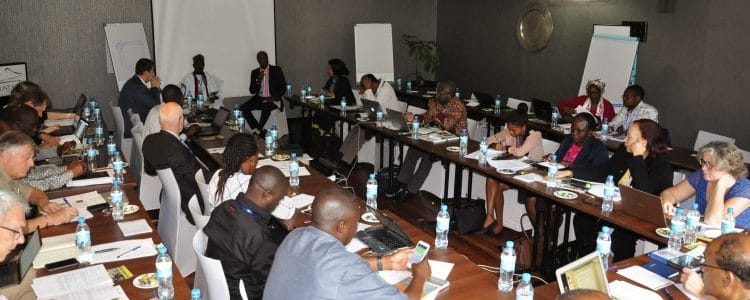
The INCLUDE roundtable on ‘Strategic actors for productive employment’ was hosted by INCLUDE and the African Economic Research Consortium in Arusha, Tanzania on 1 December. Following on from the May conference on ‘Boosting youth employment in Africa – what works and why?’, it focused on how such policies can be best designed and implemented, and which actors have the strategic capacity to stimulate this process. The roundtable generated a lively discussion between INCLUDE platform members and stakeholders from the private sector, governments, research institutions and civil society organizations in Tanzania, Kenya and Nigeria.
In the opening presentation, INCLUDE outlined several key messages from its synthesis paper based on academic research. One of these messages is that inclusive policy-making processes (i.e. those that include and empower a variety of stakeholders, such as marginalized groups) do not necessarily lead to more inclusive outcomes (in terms of improved incomes, reduced inequality or better employment opportunities). In fact, non-inclusive policy processes can sometimes lead to better outcomes, even for marginalized groups. This begs the question ‘which priorities need to be set’, as trade-offs often exist. The authors of the synthesis paper, therefore, raised the idea of ‘good enough governance’, which refers to the meeting of minimum standards for good governance while optimizing the outcomes for inclusive development. Moreover, rather than asking whether inclusive governance processes can lead to optimal outcomes, the question may be ‘under which conditions do these processes lead to optimal outcomes’. This is an issue for further debate and research.
A second message from the roundtable is about the importance of tailoring interventions to recognize the heterogeneity of groups, locations and contexts. For instance, in the May conference, the importance of distinguishing between types of youth, interventions and income levels when designing interventions aimed at improving youth employment was recognized. In the Arusha roundtable, the issue of distinguishing between different private sector actors was raised. Although all participants acknowledged that the private sector has the largest stake in creating jobs, it is important to establish what type of private sector involvement is desirable. For instance, should policymakers cooperate with companies aiming to maximize profit, or should they favour companies with social values and responsibilities?
The roundtable also highlighted examples of existing partnerships from which policymakers can learn. For instance, Mary Maganga showed how the SEVIA partnership between East West Seed, Rijk Zwaan, Wageningen University and Research Centre, and the Dutch Ministry of Foreign Affairs, together with several local stakeholders, has resulted in better employment opportunities for youth in the horticulture sector in Tanzania. However, as illustrated by both the synthesis paper and the discussions during the day, creating employment may not always be of interest to local stakeholders, such as local politicians. For instance, there is a lot of mistrust between Tanzanian companies and international companies operating in Tanzania. It was widely acknowledged that the interests of local stakeholders and international donors and government institutions are not always aligned.
Apart from initiatives that create employment directly, several presentations showed promising results in improving the employability of youth or their employment conditions. Noella Moshi shared how the WAVE programme in Lagos, Nigeria not only increases the likelihood of youth getting a job, but also significantly increases their income. Through waivers provided by the national government, WAVE is able to identify youth in different parts of Lagos and involve them in their employment services programme. The willingness to engage in these public-private partnerships was confirmed by Revelian Ngaiza (Ministry of Agriculture, Tanzania): “Whether set up from the top to the bottom or from the bottom to the top, we cooperate”. These partnerships can also involve joint knowledge production and dissemination, as demonstrated by Audax Rukonge of the Agricultural Actors Non State Forum. The co-production and dissemination of knowledge was widely acknowledged as important for improving youth employment policies.
In the closing panel, panelists Jeroen Verheul (Netherlands ambassador to Tanzania) and Lemma Senbet (AERC/INCLUDE) pointed out that many policies are heading in the right direction. In fact, innovation and new media have created new spaces for actors to influence policymaking. On the other hand, it was pointed out that the political space for civil society organizations in Africa is shrinking. Maggie Kigozi (INCLUDE) warned that the negatively changing political atmosphere in East Africa in terms of peace, security and predictability may hinder further progress.
Basil Jones, representing the African Development Bank and INCLUDE in the closing panel, highlighted the importance of evidence-based policymaking, also when it comes to good governance for youth employment. Although many initiatives exist to improve youth employment, there is inadequate funding inside Africa for research to improve these initiatives.
The discussion during the roundtable demonstrated that recognizing the right actors with strategic power is difficult, as is overcoming the constraints they face to improve their role within the policy arena. This underlines the complexity of the issue of strategic actors. Strategic actors may be strategic because of the formal power they possess within institutions, but, on the other hand, actors that are currently unable, but have high potential, to improve the conditions of marginalized groups may also be strategic actors for inclusive development.










